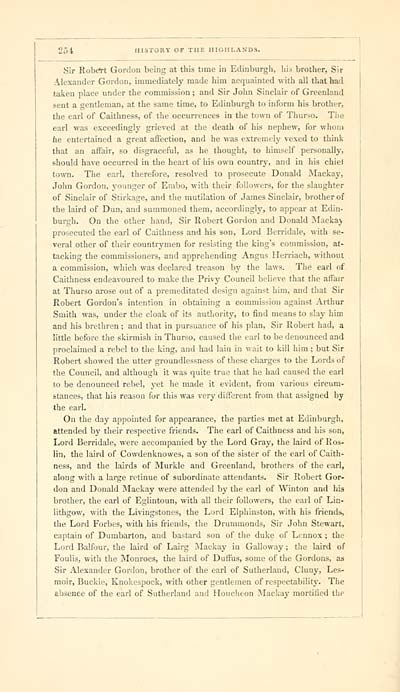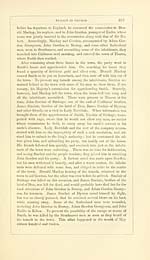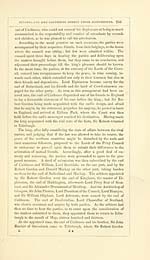Download files
Complete book:
Individual page:
Thumbnail gallery: Grid view | List view

254 HISTORY OF THE HIGHLANDS.
Sir Robert Gordon being at this tune in Edinburgh, his brother, Sir
Alexander Gordon, immediately made him acquainted with all that had
taken place under the commission ; and Sir John Sinclair of Greenland
sent a gentleman, at the same time, to Edinburgh to inform his brother,
the earl of Caithness, of the occurrences in the town of Thurso. Tlie
earl was exceedingly grieved at the death of his nephew, for whom
he entertained a great afiection, and he was extremely vexed to think
that an affair, so disgraceful, as he thought, to himself personally,
should have occurred in the heart of his own country, and in his chiel
town. Tlie earl, therefore, resolved to prosecute Donald Mackay,
John Gordon, younger of Erabo, with their followers, for the slaughter
of Sinclair of Stirkage, and the mutilation of James Sinclair, brother of
the laird of Dun, and summoned them, accordinglj', to appear at Edin-
burgh. On the other hand, Sir Robert Gordon and Donald Mackay
prosecuted the earl of Caithness and his son. Lord Berridale, with se-
veral other of tlieir countrymen for resisting the king's commission, at-
tacking the commissioners, and apprehending Angus Herriach, without
a commission, which was declared treason by the laws. The earl of
Caithness endeavoured to make the Privy Council believe that the affair
at Thurso arose out of a premeditated design against him, and that Sir
Robert Gordon's intention in obtaining a commission against Arthur
Smith was, under the cloak of its authority, to find means to slay him
and his brethren ; and tliat in pursuance of his plan, Sir Robert had, a
little before the skirmish in Thurso, caused the carl to be denounced and
proclaimed a rebel to the king, and had lain in wait to kill him ; but Sir
Robert showed the utter groundlessness of tliese charges to the Lords of
the Council, and although it was quite true that he had caused the earl
to be denounced rebel, yet he made it evident, from various circum-
stances, that his reason for this was very different from that assigned by
the earl.
On the day appointed for appearance, the parties met at Edinburgh,
attended by their respective friends. The earl of Caithness and his son,
Lord Berridale, were accompanied by the Lord Gray, the laird of Ros-
lin, the laird of Cowdenknowes, a son of the sister of the earl of Caith-
ness, and the lairds of Murkle and Greenland, brothers of the earl,
along with a large retinue of subordinate attendants. Sir Robert Gor-
don and Donald iNIackay were attended by the earl of Winton and his
brother, the earl of Eglintoun, with all their followers, the earl of Lin-
lithgow, with the Livingstones, the Lord Elphinston, with his friends,
the Lord Forbes, with his friends, the Drununonds, Sir John Stewart,
captain of Dumbarton, and bastard son of the duke of Lrnnox ; the
Lord Balfour, the laird of Lairg Mackay in Galloway ; tlie laird of
Foulis, with the Monroes, the laird of Duffus, some of the Gordons, as
Sir Alexander Gordon, brother of the earl of Sutherland, Cluny, Les-
moir, Buckie, Knokespock, with other gentlemen of respectability. The
absence of the earl of Sutherland and Houcheon Mackay mortified the
Sir Robert Gordon being at this tune in Edinburgh, his brother, Sir
Alexander Gordon, immediately made him acquainted with all that had
taken place under the commission ; and Sir John Sinclair of Greenland
sent a gentleman, at the same time, to Edinburgh to inform his brother,
the earl of Caithness, of the occurrences in the town of Thurso. Tlie
earl was exceedingly grieved at the death of his nephew, for whom
he entertained a great afiection, and he was extremely vexed to think
that an affair, so disgraceful, as he thought, to himself personally,
should have occurred in the heart of his own country, and in his chiel
town. Tlie earl, therefore, resolved to prosecute Donald Mackay,
John Gordon, younger of Erabo, with their followers, for the slaughter
of Sinclair of Stirkage, and the mutilation of James Sinclair, brother of
the laird of Dun, and summoned them, accordinglj', to appear at Edin-
burgh. On the other hand, Sir Robert Gordon and Donald Mackay
prosecuted the earl of Caithness and his son. Lord Berridale, with se-
veral other of tlieir countrymen for resisting the king's commission, at-
tacking the commissioners, and apprehending Angus Herriach, without
a commission, which was declared treason by the laws. The earl of
Caithness endeavoured to make the Privy Council believe that the affair
at Thurso arose out of a premeditated design against him, and that Sir
Robert Gordon's intention in obtaining a commission against Arthur
Smith was, under the cloak of its authority, to find means to slay him
and his brethren ; and tliat in pursuance of his plan, Sir Robert had, a
little before the skirmish in Thurso, caused the carl to be denounced and
proclaimed a rebel to the king, and had lain in wait to kill him ; but Sir
Robert showed the utter groundlessness of tliese charges to the Lords of
the Council, and although it was quite true that he had caused the earl
to be denounced rebel, yet he made it evident, from various circum-
stances, that his reason for this was very different from that assigned by
the earl.
On the day appointed for appearance, the parties met at Edinburgh,
attended by their respective friends. The earl of Caithness and his son,
Lord Berridale, were accompanied by the Lord Gray, the laird of Ros-
lin, the laird of Cowdenknowes, a son of the sister of the earl of Caith-
ness, and the lairds of Murkle and Greenland, brothers of the earl,
along with a large retinue of subordinate attendants. Sir Robert Gor-
don and Donald iNIackay were attended by the earl of Winton and his
brother, the earl of Eglintoun, with all their followers, the earl of Lin-
lithgow, with the Livingstones, the Lord Elphinston, with his friends,
the Lord Forbes, with his friends, the Drununonds, Sir John Stewart,
captain of Dumbarton, and bastard son of the duke of Lrnnox ; the
Lord Balfour, the laird of Lairg Mackay in Galloway ; tlie laird of
Foulis, with the Monroes, the laird of Duffus, some of the Gordons, as
Sir Alexander Gordon, brother of the earl of Sutherland, Cluny, Les-
moir, Buckie, Knokespock, with other gentlemen of respectability. The
absence of the earl of Sutherland and Houcheon Mackay mortified the
Set display mode to: Large image | Transcription
Images and transcriptions on this page, including medium image downloads, may be used under the Creative Commons Attribution 4.0 International Licence unless otherwise stated. ![]()
| Early Gaelic Book Collections > Ossian Collection > History of the Highlands and of the Highland clans > Volume 1 > (368) |
|---|
| Permanent URL | https://digital.nls.uk/79677013 |
|---|
| Description | Vol. I. |
|---|---|
| Shelfmark | Oss.247 |
| Additional NLS resources: | |
| Attribution and copyright: |
|
| Description | Selected books from the Ossian Collection of 327 volumes, originally assembled by J. Norman Methven of Perth. Different editions and translations of James MacPherson's epic poem 'Ossian', some with a map of the 'Kingdom of Connor'. Also secondary material relating to Ossianic poetry and the Ossian controversy. |
|---|
| Description | Selected items from five 'Special and Named Printed Collections'. Includes books in Gaelic and other Celtic languages, works about the Gaels, their languages, literature, culture and history. |
|---|

